Friday, October 12, 2012
Glitch by Tiny Speck
glitch
My MMO history has been very briefly detailed on a previous post, but the even shorter form is that I've played nothing for more than a week. Glitch doesn't buck that trend, but it was still a damned good week.
I came to Glitch because of the news that Keito Takehashi, of Katamari Damacy and Noby Noby Boy 'fame' was seduced back to working on video games (from his brief retirement spent designing playground structures) by the promise of this game. He even moved from Japan to Vancouver for it. Yikes! Worth a moment of my time at least.
I got on the beta invite list as soon as I could and played it, and I don't really remember it, except that it was boring and I milked a bunch of butterflies. The art was pretty, but the game was dumb. That was probably a year ago. A few weeks ago, I decided it was worth another shot and I don't think I did anything but for the next three days.
There is no combat in Glitch, and this is its genius twist. Combat can never be anything but a competition, and this competition infects all other MMO like the selfish meme it is. Even if the frame is 'us vs them' the spirit of the world is inevitably dragged into blades and conquest. By never bringing combat into the picture, Glitch has the potential of being a peaceful world about sharing and love and butterflies and nibbling on pigs.
Of course, potential could go bad, which is why it's so valuable that Glitch does everything it can to convince you to give, and give, and give. For instance, the tutorial grants you an item called Random Kindness which enables you to bestow 50 Energy on another player in the same zone as you. One of my early experiences involved bestowing Random Kindness on another player who was hanging around mining, who jumped for joy, but then promptly wandered off. Five minutes later, she returned, accompanied by a mate. A little speech bubble popped up over her head: "this one". Her friend jumped once, then gave me a rather valuable bowl of chili, and the two were on their way.
What was the benefit of going out of their way to reward my sharing? I don't know what was on their mind specifically, but I do know that I never hesitated to share. And others never hesitated to share with me.
Glitch is a game about economy, and while it's an economy based primarily on personal accumulation, the impetus for accumulation is not a sense of competition and miserliness over the goods you have but rather endless trading. That this trade is rarely a barter per se, but rather an exchange of gifts and mainly with strangers, is a true triumph. And a triumph not just for games, but for society in general. I'm not sure I can overstate this game's effect on my optimism while I was ventured into it.
Wednesday, July 18, 2012
VoEC: Personal Trip to the Moon
When I'm not writing about videogames (and I seem to be writing about videogames very infrequently these days) I enjoy writing poetry. And in those poems, I betray an obsession with the moon. I don't think about the moon all that much in my daily life, but as soon as pen hits paper it's moon moon moon moon moon. If I could replace all subjects and objects with "the moon" I would feel not limited, but thrilled my the opportunity presented. Maybe in a few years I will find a moon cult to join and everything will be alright forever.
With that content, maybe you will understand my excitement when some of my favourite corners of the internet began buzzing about a game called "Personal Trip To The Moon", a flash work on Newgrounds. I don't normally think about the moon as something to "go to" but now that the idea has been planted in my head, I'm thrilled by it. I wonder though, if a work is called "Personal Trip To The Moon" by its creator, how personal can it be for the player?
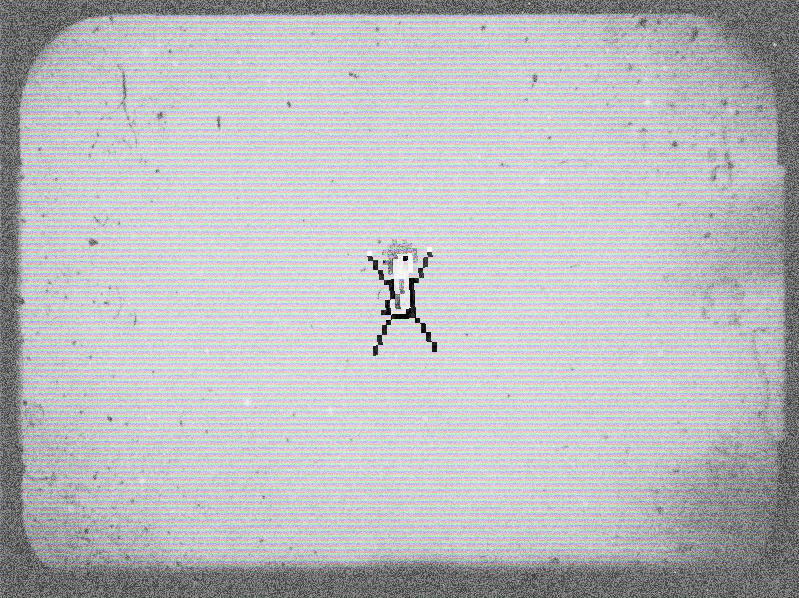 I’m not going to answer that question right away, even though I’ve decided on the answer. That’s a way of making you read more. Sneaky, huh?
I’m not going to answer that question right away, even though I’ve decided on the answer. That’s a way of making you read more. Sneaky, huh?
Yesterday, Kay and I were out for a walk and I told her about Personal Trip to the Moon. Specifically how similar the visual style was to Jasper Byrne Lone Survivor (which I still haven’t finished, if you’re following my game completion exploits). Both games feature very textured pixel art under heavy filtering. The result is all the charm of pixel art with the self-awareness to acknowledge that the game is on a device capable of more. This kind of visual, musical, narrative, or mechanical quotation is particularly common in games because of the scope required of such a multimedia project. Not every designer can be a jack of all trades, and even if they are, how does one innovate in each area on each project? So, I don’t think that the quotation is a downside, or requiring of an excuse. Furthermore, I really like this kind of style and it’s very fresh, and I think here very well executed. It was splendid to watch in motion.
The motion in question is a slow walk, following by a swimming sort of flight. Doing the breaststroke in space. Your avatar wears a nice suit with a necktie, and appears to only have one eye. Is the titular journey best called one small step for man but one giant leap for a cyclops? I won’t spoil how I interpreted the story, because I thought it was a good one. But it will take you to the moon and back at least twice and into a new body. It knows well one of the most important elements of a narrative, namely where to cut at the beginning and the end, creating a perfectly framed narrative. This is really enhanced by a sound design which cuts in and out suddenly, and at the right time. It feels like a very controlled experience. Which is part of the problem.
The beginning and end are very deliberate walk and read affairs, with plenty of well written dialogue. In strong contrast is the entire middle section of the short game which features meandering through space and receiving microfictions about the various goings on in the area between earth and moon. But space is empty. And I got bored. The exploration section was either too long, or too short. And the freedom granted was both too much (giving me the freedom to bore myself) or too little (giving me so little to do or see). When the game decided to snatch back the narrative reigns I felt a bit cheated.
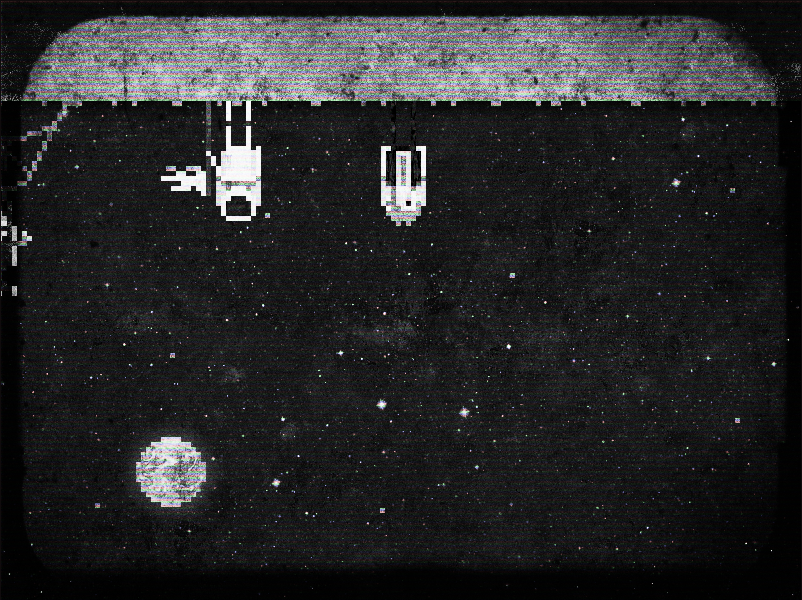 I feel like this may be the biggest insult I can give, but I have to say it, and I say it through mostly closed lips, as quietly as I can... but I think this game would have been better as a movie. It breaks my heart to call this game anything other than brilliant, because so much of it excites me. Maybe it did become my personal trip to the moon. And I was disappointed in the beginning, middle, and end.
I feel like this may be the biggest insult I can give, but I have to say it, and I say it through mostly closed lips, as quietly as I can... but I think this game would have been better as a movie. It breaks my heart to call this game anything other than brilliant, because so much of it excites me. Maybe it did become my personal trip to the moon. And I was disappointed in the beginning, middle, and end.
But I look fondly toward first time designer VOEC`s next game. I suspect she may have further excellent stories to tell.
With that content, maybe you will understand my excitement when some of my favourite corners of the internet began buzzing about a game called "Personal Trip To The Moon", a flash work on Newgrounds. I don't normally think about the moon as something to "go to" but now that the idea has been planted in my head, I'm thrilled by it. I wonder though, if a work is called "Personal Trip To The Moon" by its creator, how personal can it be for the player?
Yesterday, Kay and I were out for a walk and I told her about Personal Trip to the Moon. Specifically how similar the visual style was to Jasper Byrne Lone Survivor (which I still haven’t finished, if you’re following my game completion exploits). Both games feature very textured pixel art under heavy filtering. The result is all the charm of pixel art with the self-awareness to acknowledge that the game is on a device capable of more. This kind of visual, musical, narrative, or mechanical quotation is particularly common in games because of the scope required of such a multimedia project. Not every designer can be a jack of all trades, and even if they are, how does one innovate in each area on each project? So, I don’t think that the quotation is a downside, or requiring of an excuse. Furthermore, I really like this kind of style and it’s very fresh, and I think here very well executed. It was splendid to watch in motion.
The motion in question is a slow walk, following by a swimming sort of flight. Doing the breaststroke in space. Your avatar wears a nice suit with a necktie, and appears to only have one eye. Is the titular journey best called one small step for man but one giant leap for a cyclops? I won’t spoil how I interpreted the story, because I thought it was a good one. But it will take you to the moon and back at least twice and into a new body. It knows well one of the most important elements of a narrative, namely where to cut at the beginning and the end, creating a perfectly framed narrative. This is really enhanced by a sound design which cuts in and out suddenly, and at the right time. It feels like a very controlled experience. Which is part of the problem.
The beginning and end are very deliberate walk and read affairs, with plenty of well written dialogue. In strong contrast is the entire middle section of the short game which features meandering through space and receiving microfictions about the various goings on in the area between earth and moon. But space is empty. And I got bored. The exploration section was either too long, or too short. And the freedom granted was both too much (giving me the freedom to bore myself) or too little (giving me so little to do or see). When the game decided to snatch back the narrative reigns I felt a bit cheated.
But I look fondly toward first time designer VOEC`s next game. I suspect she may have further excellent stories to tell.
Labels:
personal trip to the moon,
personaltriptothemoon,
space,
theo,
VoEC
Saturday, May 26, 2012
Jon Caplin: Reprisal
Bothering little virtual people possessing simplified or nonexistant emotional behaviours is an important part of the cathartic function provided by videogames. When I was in elementary school, The Sims were a big thing, and everyone was playing virtual dollhouse. Making endless denizens of computerland mate, soil themselves, or start a cooking fire in a two-metre square room with no windows or doors was of constant entertainment to our young minds. cuteso101 on Yahoo! Answers even wonders if The Sims 2 is the best game ever.
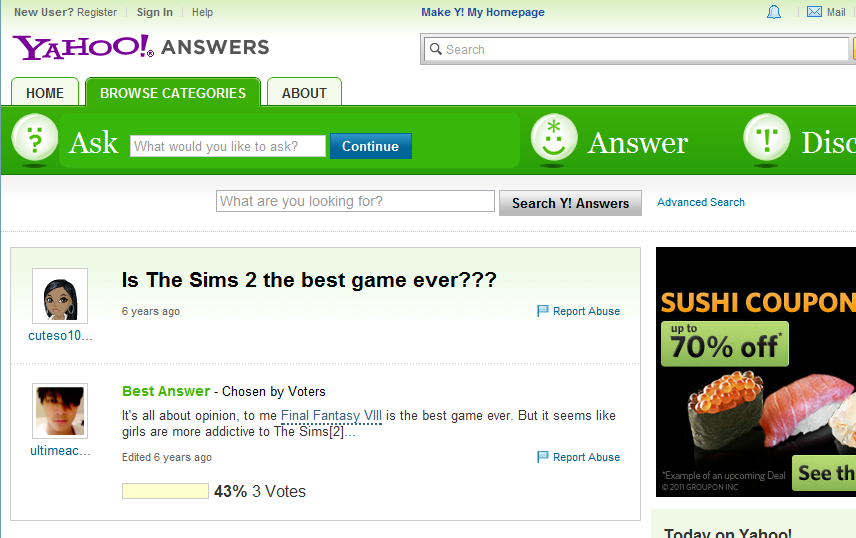
As seen above, she is helpfully reminded by another user that because she is a girl she is unnaturally predisposed to enjoying The Sims and that it probably isn’t the greatest game ever. Too bad. If it were the greatest game ever, I could comfortably write this article as follows:
(un)Fortunately, we live in a world where there is not consensus that The Sims is the greatest game of all time. That being said, there still exists the hypothesized game of pushing around soil and dropping fireballs on little people, and it’s called Populous.

Populous was released in 1989 by Peter Molyneux’s Bullfrog Productions and invented the “God” genre of games, where your avatar is an unseen deity ruining the day of many little worshippers who you rely upon for the magical power of prayer, but not much else. How you keep them faithful is up to you. And to most players, the fun is all Schadenfreude and Sadism.
Through the next decade and a bit beyond, Molyneux used Bullfrog Productions, as well as its successor, Lionhead Studios, to continue to build on the experiences birthed by his first God game through the dystopian corporate future of Syndicate, to the slightly more humble Magic Carpet (you only get to be a wizard this time), and to its peak with probably the most majestic God simulator, Black and White, which took advantage of 3D graphics to make the cruelty of the “miracles” you provided much more thrilling.
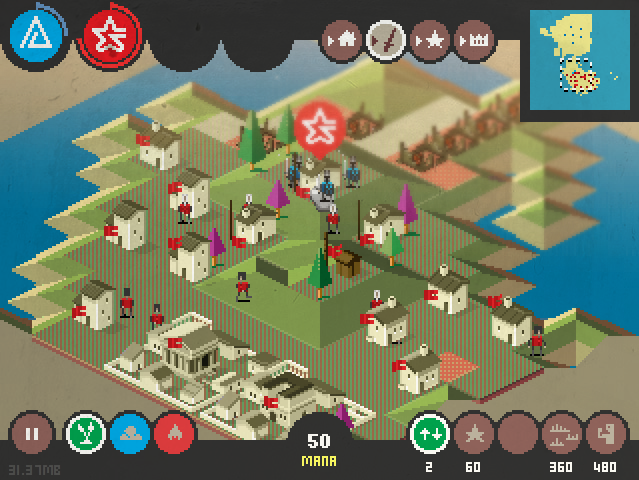
Designer Jon Caplin has released a flash game called Reprisal which takes very fondly after Populous. It is very faithful to the original in feel, but also seems quite modern in its elegance. Reprisal is a good bit of neo-retro flashback to the early days of computer games, and if you don’t feel like loading up DOSbox to run creaky old Populous, it’s your best bet.
Scratch that, even if you have the energy and will to play Populous, play Reprisal. It’s well put together, cute, and I really feel for the little guys running around on my screen.
A thought has struck me: maybe I’m facilitating the murder of many electronic citizens by sharing this link. So, for my own moral well being, I beg of you to have a bit of mercy.
Here is the link. Now go forth and play.
As seen above, she is helpfully reminded by another user that because she is a girl she is unnaturally predisposed to enjoying The Sims and that it probably isn’t the greatest game ever. Too bad. If it were the greatest game ever, I could comfortably write this article as follows:
So like you know that game, The Sims, guys? Duh, of course you do. It is literally the greatest game ever [no sarcasm here in the alternate universe]. It came out in 2000 and still won six awards at the 2012 gaming Oscars. Well listen, I know you’re mostly playing The Sims right now so you don’t care, but hear me out: there is another game. I know!! CRAZY, RIGHT?
So like in this game--which is kind of like The Sims--you like move dirt and stuff--which you can totally do in The Sims too, and it’s better there--and then all these people like build houses and stuff on them--just like in The Sims, except that you don’t have to build the houses, they do it for you! [cue angry screams from the audience in this alternate world that this is just The Sims for girls or moms or whoever those gamers look down on] And then you tell them to do stuff and they do and it’s great! You can also put fireballs on people, which you can’t do in the Sims, and there are like levels and stuff. If you have a minute while your Sims game is busy Reticulating Splines, you should probably give this one a shot.
(un)Fortunately, we live in a world where there is not consensus that The Sims is the greatest game of all time. That being said, there still exists the hypothesized game of pushing around soil and dropping fireballs on little people, and it’s called Populous.
Populous was released in 1989 by Peter Molyneux’s Bullfrog Productions and invented the “God” genre of games, where your avatar is an unseen deity ruining the day of many little worshippers who you rely upon for the magical power of prayer, but not much else. How you keep them faithful is up to you. And to most players, the fun is all Schadenfreude and Sadism.
Through the next decade and a bit beyond, Molyneux used Bullfrog Productions, as well as its successor, Lionhead Studios, to continue to build on the experiences birthed by his first God game through the dystopian corporate future of Syndicate, to the slightly more humble Magic Carpet (you only get to be a wizard this time), and to its peak with probably the most majestic God simulator, Black and White, which took advantage of 3D graphics to make the cruelty of the “miracles” you provided much more thrilling.
Designer Jon Caplin has released a flash game called Reprisal which takes very fondly after Populous. It is very faithful to the original in feel, but also seems quite modern in its elegance. Reprisal is a good bit of neo-retro flashback to the early days of computer games, and if you don’t feel like loading up DOSbox to run creaky old Populous, it’s your best bet.
Scratch that, even if you have the energy and will to play Populous, play Reprisal. It’s well put together, cute, and I really feel for the little guys running around on my screen.
A thought has struck me: maybe I’m facilitating the murder of many electronic citizens by sharing this link. So, for my own moral well being, I beg of you to have a bit of mercy.
Here is the link. Now go forth and play.
Labels:
Bullfrog,
Jon Caplin,
Lionhead,
Little People,
Populous,
Reprisal,
The Sims,
theo
Thursday, May 24, 2012
Jasper Byrne: Lone Survivor
The first time I played Bioshock, I got to the second level, and then turned it off in disgust and wrote a great big blog post (thankfully lost) about how much I was disgusted by its exploitation of violence and fear to prove its point. If you were trying to make a game with a message, I thought, why stoop to that level?
After putting it down for three weeks, I picked it back up again and raced through most of the rest of the game. It won me over. I was just being pretentious. The viscera was pretty thrilling once I got past the shock value. And that game--despite its flaws--is still something of a masterpiece.
I get an echo of that first reaction every time I pick up a new horror game. I’m deathly afraid and a bit grossed out by them. Maybe that’s the point. That hasn’t sullied my eventual respect for many titles, because even if the only emotion horror games can conjure up is fear, that’s a pretty strong feeling.
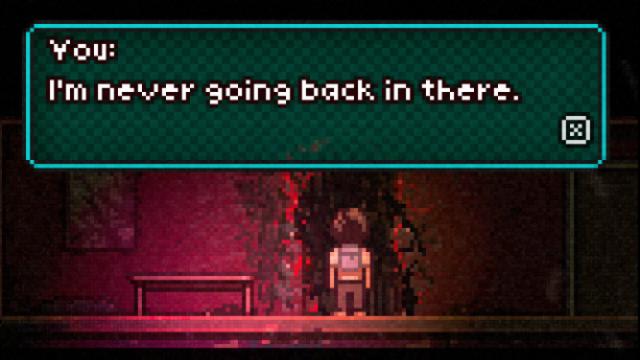
Predictably, I had the gut-disgust frustration reaction to Jasper Byrne’s side-scrolling survival-horror Lone Survivor after playing the first twenty minutes. Too many scary zombies and darkness and flesh-walls. But I’d heard so many good things. And it looked so neat. And the music was fantastic. And the writing was charming. And I pushed through.
Twenty minutes or so into the game, after it had almost completely frozen my mind with terror, my character trundled up to the first destination; tired, hungry, and scared. And through the outside wall of apartment 204, a faint sound. Could it be? Salvation? Human life?
Cool Jazz. There was a party in there. And everyone was piss-drunk.
OK game, you’ve got me.

But damn, do I still get really tired of dealing with zombies. Add to those shivering undead nightmares an oppressive and not especially transparent system for hunger, as well as for energy, and it’s a game which I find emotionally exhausting to play. A typical scenario follows: being chased by non-descript (read lovecraftly awful) bits of walking flesh through corridors while your character is bleary from sleep and hunger and you know you have only got enough bullets left to take down one of the zombies and they’re right behind you and oh no the battery is almost out on this flashlight and now you can’t see the buggers who are after you and you pause after you have some distance and open the inventory where there isn’t any food to be found and you collapse of exhaustion.
It’s a relief then that Lone Survivor builds in some really interesting ways of dealing with the horror around you. The player character’s comments on his environment are occasionally silly, in the way that someone suffering from cabin fever in an inexplicable situation must be expected to be. Furthermore, a truly surreal scenario is never but ten more minutes of play away, at which point excellent music usually kicks in, and twin peaks inspired oddity ensues.
And if things are getting really trying, there’s always the pills...
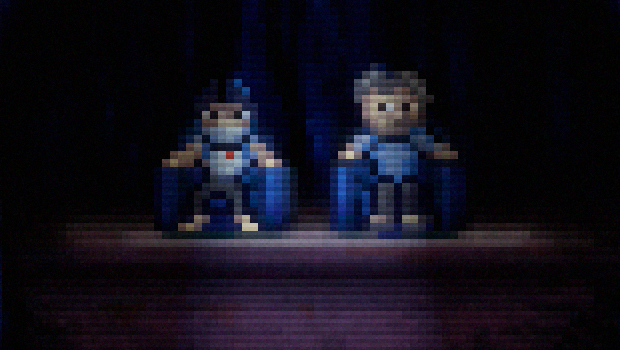
Early in the game you find a handful of differently coloured pills which aren’t accompanied by instructions. If you scour hard enough, some vagueities on their purpose can be found scribbled on pieces of paper or alluded to by a man with a box on his head. Through either non-clinical self-trials of these medications or careful extrapolation from the hints I found, I figured out that I could use the green or the blue pills before I went to sleep to end up in a few dream sequences where mysterious individuals appeared to be able to answer my questions. Ah, but of course, as can be expected from narcotics induced lucid dreams, more questions are asked than answers given.
As the horror ramped up, and my concerns about where to go to move on, and where to find light, and where to find bullets, and where to find food began to overwhelm me, I found myself running back to bed more often to eat some cheese and crackers, take the green pill and fall asleep. The man with a box on his head was always there, and each time had a new question for me. Each time, a reveal of what is going on in this zombie-world is teased, and each time that relief is denied. But I take more and more pills.
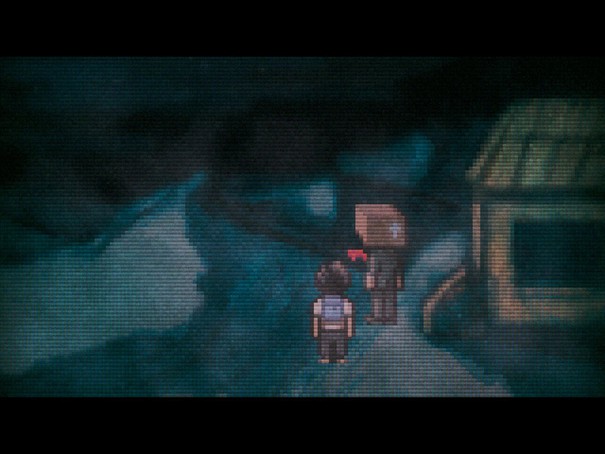
“Maybe a blue next? No, why did I take a blue, what a waste of a night, I could have taken another green. He would have had an answer this time.” The whole while the food is running out, the days are passing by, and I’m staying in bed, dreaming.
I haven’t finished Lone Survivor yet because I’ve been busy with real life. Some mornings I wake up, and I don’t want to go to work. The customers can seem a bit like a horde of emotionless zombies. Often enough in real life, I would love to take an ibuprofin and go back to sleep, rather than facing those zombies outside. So while I’m not done with the game, I feel I can safely thank it for giving me another world in which to contemplate staying in bed.
After putting it down for three weeks, I picked it back up again and raced through most of the rest of the game. It won me over. I was just being pretentious. The viscera was pretty thrilling once I got past the shock value. And that game--despite its flaws--is still something of a masterpiece.
I get an echo of that first reaction every time I pick up a new horror game. I’m deathly afraid and a bit grossed out by them. Maybe that’s the point. That hasn’t sullied my eventual respect for many titles, because even if the only emotion horror games can conjure up is fear, that’s a pretty strong feeling.
Predictably, I had the gut-disgust frustration reaction to Jasper Byrne’s side-scrolling survival-horror Lone Survivor after playing the first twenty minutes. Too many scary zombies and darkness and flesh-walls. But I’d heard so many good things. And it looked so neat. And the music was fantastic. And the writing was charming. And I pushed through.
Twenty minutes or so into the game, after it had almost completely frozen my mind with terror, my character trundled up to the first destination; tired, hungry, and scared. And through the outside wall of apartment 204, a faint sound. Could it be? Salvation? Human life?
Cool Jazz. There was a party in there. And everyone was piss-drunk.
OK game, you’ve got me.
But damn, do I still get really tired of dealing with zombies. Add to those shivering undead nightmares an oppressive and not especially transparent system for hunger, as well as for energy, and it’s a game which I find emotionally exhausting to play. A typical scenario follows: being chased by non-descript (read lovecraftly awful) bits of walking flesh through corridors while your character is bleary from sleep and hunger and you know you have only got enough bullets left to take down one of the zombies and they’re right behind you and oh no the battery is almost out on this flashlight and now you can’t see the buggers who are after you and you pause after you have some distance and open the inventory where there isn’t any food to be found and you collapse of exhaustion.
It’s a relief then that Lone Survivor builds in some really interesting ways of dealing with the horror around you. The player character’s comments on his environment are occasionally silly, in the way that someone suffering from cabin fever in an inexplicable situation must be expected to be. Furthermore, a truly surreal scenario is never but ten more minutes of play away, at which point excellent music usually kicks in, and twin peaks inspired oddity ensues.
And if things are getting really trying, there’s always the pills...
Early in the game you find a handful of differently coloured pills which aren’t accompanied by instructions. If you scour hard enough, some vagueities on their purpose can be found scribbled on pieces of paper or alluded to by a man with a box on his head. Through either non-clinical self-trials of these medications or careful extrapolation from the hints I found, I figured out that I could use the green or the blue pills before I went to sleep to end up in a few dream sequences where mysterious individuals appeared to be able to answer my questions. Ah, but of course, as can be expected from narcotics induced lucid dreams, more questions are asked than answers given.
As the horror ramped up, and my concerns about where to go to move on, and where to find light, and where to find bullets, and where to find food began to overwhelm me, I found myself running back to bed more often to eat some cheese and crackers, take the green pill and fall asleep. The man with a box on his head was always there, and each time had a new question for me. Each time, a reveal of what is going on in this zombie-world is teased, and each time that relief is denied. But I take more and more pills.
“Maybe a blue next? No, why did I take a blue, what a waste of a night, I could have taken another green. He would have had an answer this time.” The whole while the food is running out, the days are passing by, and I’m staying in bed, dreaming.
I haven’t finished Lone Survivor yet because I’ve been busy with real life. Some mornings I wake up, and I don’t want to go to work. The customers can seem a bit like a horde of emotionless zombies. Often enough in real life, I would love to take an ibuprofin and go back to sleep, rather than facing those zombies outside. So while I’m not done with the game, I feel I can safely thank it for giving me another world in which to contemplate staying in bed.
Labels:
fear,
jasper byrne,
lone survivor,
pills,
review,
theo,
theoisawimp,
twin peaks,
Zombies
Wednesday, May 2, 2012
Double Dog Ludum Dare Vol I: Geometries Around Explosions
Double Dog Ludum Dare is a series where we explore games made for Ludum Dare events, a series of game jams with a time limit of one weekend. The most recent iteration, the 23rd, was held from April 20th-23rd, 2012. The theme this time around was “Tiny World.” Because of the stringent time limit, the finished products range from haiku-like pieces of inspired design, to completely scattered, dysfunctional skeletons. We subject ourselves to it all. (to try out the games, click the blue headers, duh.)
Birchmountain: Cylcubere Origins

Right off the bat, a real winner. A sinister smiling face greets you and a downwards pitch-shifted voice says, “Hello.” Then, “What is your favourite geometry?” Your choices are Cube, Sphere, Cylinder, and curiously, Cylcubere, a portmanteau combining the three previous geometries. The idea of a cylcubere freaks me right out, and I don’t want to think about it.
Next, the face asks your favourite colour. Then the lights come on. In my case, a red sphere was in the middle of the room. A personification of my particular affections. The face was revealed to belong to the cylcubere, who proceeded to test my typing abilities, followed by my abilities to keep my mouse cursor in a moving square. Both very important skills indeed. The difficulty came when for whatever reason the mechanism which was supposed to recognize that my mouse cursor was indeed in the square malfunctioned and the malicious cylcubere roasted my sphere in jets of flame.
And so for me, the game was ended. Like I said, a real winner.
Naouak: Fire Around
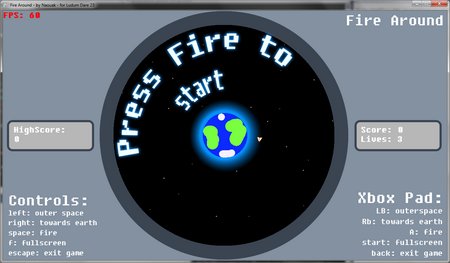
You play a spacecraft trapped in orbit around a tiny world. You can adjust the radius of your orbit, but otherwise, your craft keeps spinning around and around and around and around. If you fire your green bullets they spin around and around and around and around as well. If an enemy spaceship happens to appear in the path of your bullets, it goes boom and falls to earth, the remainder burning up in the atmosphere.
Of course, those enemies are shooting back at you, and you get stuck in this loop of bullets which goes around and around and around and around the world and eventually you can’t deal with the shots orbiting around and around and around and around. And then your spaceship goes boom and falls to earth, the remainder burning up in the atmosphere.
A great execution on a nice concept for a shmup, and the perpetual rotation made the whole ordeal pretty disorienting. Very difficult to wrap the head around (and around and around and around).
Tempest: Materia
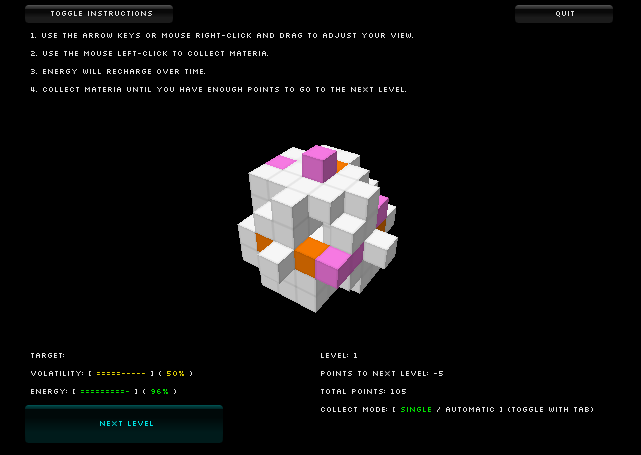
Made in only 24 hours, Materia is a bit like playing nuclear jenga. You are tasked with collecting cubes of various colours without compromising the integrity of the Materia. Because then it explodes. And the game’s over. No one wants the game to be over, do they?
You expend energy to collect cubes. White cubes give you few points, but at little consequence. Orange cubes give you many more point, but require more energy. Pink cubes eat away at the integrity of the whole structure. Finally, red cubes give you a lot of points, but almost completely compromise the integrity of the Materia. Every 100 points, you can progress to the next level, where a new structure is displayed for you to dismantle.
The play field is presented similarly to the sadly unheralded Picross 3D for the Nintendo DS. For those who haven’t played that game (most people, I’d imagine) let me explain. You have a structure which you can rotate along all axes with your mouse by holding the right button and dragging. Because you’re working with a 3D object, it’s important to be able to see it from any angle so as to catch any pesky, lurking cubes. By left clicking on a cube, it is chipped away, revealing what it underneath.
I find the execution of this project very impressive for a game developed in 24 hours, but it does show obvious limitations as well. It suffers from being repetitive very quickly (similar) because it involves the repetition of basically the same one mechanic for the entirety of the gameplay. The addition of a time limit per level may have helped this. One feature I found particularly interesting was that you aren’t forced to move on to the next level as soon as it is unlocked. Instead you can harvest more points off of the one you’re on, and carry those through. By completely mining the first two levels out, I could completely skip the next three levels, because I’d already achieved the point requirements for them. This kind of idea would work very well if the scoring of points was based on skill, rather than tedious tenacity. By playing well and proving yourself, you would earn the right to skip through a few levels, to find a real challenge.
I think this is worth a play, if just to marvel at what the developer made all by himself, in one day.
This is what Ludum Dare is all about.
Birchmountain: Cylcubere Origins
Right off the bat, a real winner. A sinister smiling face greets you and a downwards pitch-shifted voice says, “Hello.” Then, “What is your favourite geometry?” Your choices are Cube, Sphere, Cylinder, and curiously, Cylcubere, a portmanteau combining the three previous geometries. The idea of a cylcubere freaks me right out, and I don’t want to think about it.
Next, the face asks your favourite colour. Then the lights come on. In my case, a red sphere was in the middle of the room. A personification of my particular affections. The face was revealed to belong to the cylcubere, who proceeded to test my typing abilities, followed by my abilities to keep my mouse cursor in a moving square. Both very important skills indeed. The difficulty came when for whatever reason the mechanism which was supposed to recognize that my mouse cursor was indeed in the square malfunctioned and the malicious cylcubere roasted my sphere in jets of flame.
And so for me, the game was ended. Like I said, a real winner.
Naouak: Fire Around
You play a spacecraft trapped in orbit around a tiny world. You can adjust the radius of your orbit, but otherwise, your craft keeps spinning around and around and around and around. If you fire your green bullets they spin around and around and around and around as well. If an enemy spaceship happens to appear in the path of your bullets, it goes boom and falls to earth, the remainder burning up in the atmosphere.
Of course, those enemies are shooting back at you, and you get stuck in this loop of bullets which goes around and around and around and around the world and eventually you can’t deal with the shots orbiting around and around and around and around. And then your spaceship goes boom and falls to earth, the remainder burning up in the atmosphere.
A great execution on a nice concept for a shmup, and the perpetual rotation made the whole ordeal pretty disorienting. Very difficult to wrap the head around (and around and around and around).
Tempest: Materia
Made in only 24 hours, Materia is a bit like playing nuclear jenga. You are tasked with collecting cubes of various colours without compromising the integrity of the Materia. Because then it explodes. And the game’s over. No one wants the game to be over, do they?
You expend energy to collect cubes. White cubes give you few points, but at little consequence. Orange cubes give you many more point, but require more energy. Pink cubes eat away at the integrity of the whole structure. Finally, red cubes give you a lot of points, but almost completely compromise the integrity of the Materia. Every 100 points, you can progress to the next level, where a new structure is displayed for you to dismantle.
The play field is presented similarly to the sadly unheralded Picross 3D for the Nintendo DS. For those who haven’t played that game (most people, I’d imagine) let me explain. You have a structure which you can rotate along all axes with your mouse by holding the right button and dragging. Because you’re working with a 3D object, it’s important to be able to see it from any angle so as to catch any pesky, lurking cubes. By left clicking on a cube, it is chipped away, revealing what it underneath.
I find the execution of this project very impressive for a game developed in 24 hours, but it does show obvious limitations as well. It suffers from being repetitive very quickly (similar) because it involves the repetition of basically the same one mechanic for the entirety of the gameplay. The addition of a time limit per level may have helped this. One feature I found particularly interesting was that you aren’t forced to move on to the next level as soon as it is unlocked. Instead you can harvest more points off of the one you’re on, and carry those through. By completely mining the first two levels out, I could completely skip the next three levels, because I’d already achieved the point requirements for them. This kind of idea would work very well if the scoring of points was based on skill, rather than tedious tenacity. By playing well and proving yourself, you would earn the right to skip through a few levels, to find a real challenge.
I think this is worth a play, if just to marvel at what the developer made all by himself, in one day.
This is what Ludum Dare is all about.
Monday, April 30, 2012
Hutch Games Ltd: Smash Cops
Smash Cops by Hutch is a game in which you play RoboCop if RoboCop was a police car instead of a police robot. In the world I live in, the word arrest means to accost a lawbreaker with the minimum necessary force to allow the arresting officer to charge the individual with whatever crime they have committed. In the world of Smash Cops, the word arrest means to render the lawbreaker’s vehicle (and presumably the human contents of said vehicle) to a charred mess. Perhaps in this world, people are cars, and this is just the logical violent extension of the Pixar film Cars’ anthropomorphic four-wheeled characters.

The problems with this otherwise enthusiastic game begin with the fact that you cannot listen to a podcast while playing. The game’s audio overrides any external audio upon startup, even when you have silenced all in-game audio. This seems like a move of arrogance for two reasons: firstly, any application which overrides the primary functionality on what is essentially a glorified MP3 player for nonessential reasons demonstrates a fundamental misunderstanding of the platform; and secondly, the game is not nearly rich enough to warrant a demand of one’s full attention regardless. This kind of override is annoying (and thankfully, is going out of fashion in iOS games), but is almost forgivable on a complex story-driven game, or one which makes use of its sound design in a fundamental way, but in this case, the 70s cop show knockoff theme tunes are--while amusing--not nearly amusing enough to warrant such a hobbling of the user’s device.
Further problems include repetitive level design, not helped by the relatively few ways you can effectively confront situations; properly annoying in-app purchases; and a disappointingly shallow collectible system (more on that later).This is another conceptually interesting game marred by a lack of follow through. That being said, I do believe this could have been something special, and now that my pessimism is out of the way, I can gush over how much fun the concept is, and over the few things it does well. Phew!
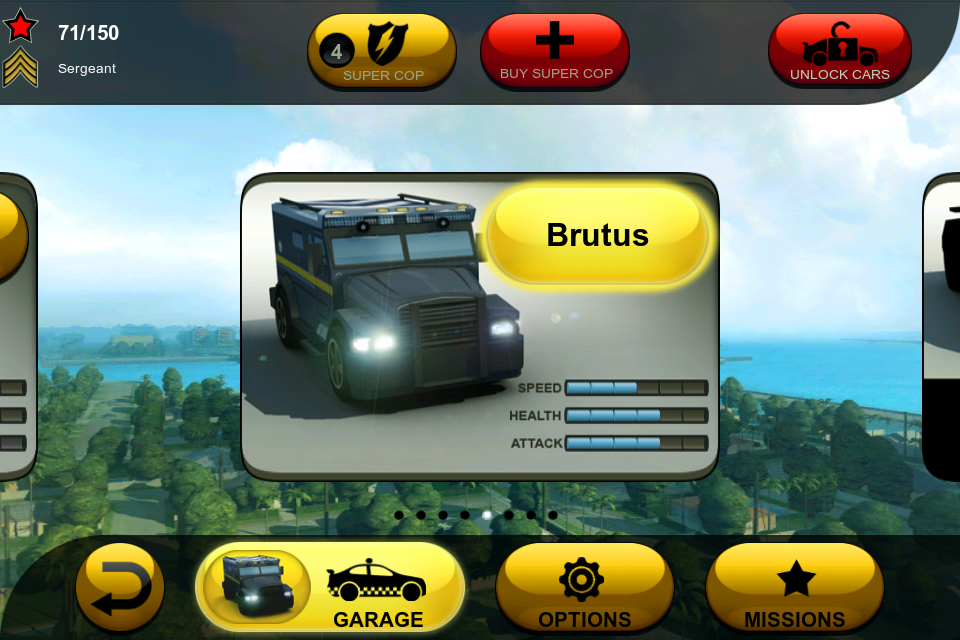
The controls are properly innovative. To best understand, a metaphor: imagine your fingers, nay, your whole body has turned into water. There is a droplet of oil in front of you. By putting your finger to one side of the droplet, it goes speeding off in the other direction, because of course, oil and water do not mix. This is how you drive your car in Smash Cops. Make sense? Also, this is how every iOS game should handle driving cars in the future. Please, heed my words, developers.
Most missions consist of trying to “arrest” a number of vehicles participating in gang activity, joyriding, or street racing. Remember of course, that in this game, an arrest is a euphemism for a vehicle which has been rendered a smoking carcass. The easiest way I’ve found to make an arrest is to pass an offending vehicle, pull a hairpin turn, and tap the screen for a “ram” boost ability, propelling your police vehicle headfirst into the front bumper of the criminal. This will execute a “smash” and hopefully an “arrest”. Other missions involve ones where you’re trying to race to a specific destination before pursuing vehicles destroy you, which are generally fairly simple, because your opponents tend to take themselves out in the process of trying bash into you.
My favourite mission has the description “Destroy as many illegally parked cars as possible” and suitably ended in carnage as I slid around a parking lot and the surrounding streets completely destroying vehicles parked in comically poor places, including one parked perpendicular to traffic in the middle of a road.
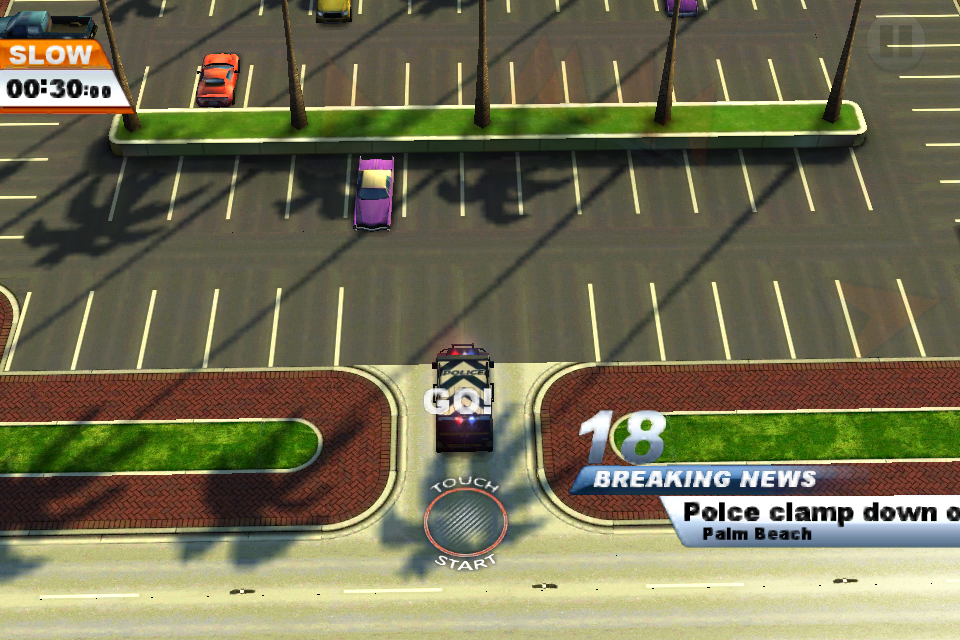
Sometimes other cops enter the fray, ostensibly in your support, but they mostly get in the way, and you are harshly penalized for destroying them, despite how bloody annoying they are. The mirthful violence and cops vs gangsters theme of this game reminded me pleasantly of Crackdown, and makes me wish that game had had driving missions like this one.
Smash Cops isn’t a bad game, it’s not a particularly good one either. There are much more interesting games available for the asking price, and to be perfectly honest, I feel a bit insulted by the in-app purchases, which consist of Super Cop powerups as well as early unlocks of cars. I really don’t feel those purchasing options were necessary in this game, though I suppose talking about in-app purchases in your design docs makes investors pretty happy, so I don’t really blame them. The controls are really pretty neat though, and this carmageddon has a charmingly RoboCop sense of humour. Your call on this one, Officer.
PS. (on the semantics of collectables)
When I collect donuts in the world, don’t tell me I’m collecting pieces of donuts, when I am clearly collecting whole donuts. Furthermore, if I work hard each level to assemble a full donut out of three donut pieces, the least a game can do is acknowledge that with some sort of reward.
Now that I think about it, maybe the game is implying with the donut synecdoche that my cop is eating two thirds of each donut, leaving only a part, and requiring two more donuts to assemble those parts into a whole. Which is probably an off-hand insult to cops, because any reasonable person would just eat the two whole donuts and save the third to present back at the station, or to whoever it is that is so interested in this one-donut-per-level.
Let’s go easy on the persons in uniform, Hutch Games Ltd.
The problems with this otherwise enthusiastic game begin with the fact that you cannot listen to a podcast while playing. The game’s audio overrides any external audio upon startup, even when you have silenced all in-game audio. This seems like a move of arrogance for two reasons: firstly, any application which overrides the primary functionality on what is essentially a glorified MP3 player for nonessential reasons demonstrates a fundamental misunderstanding of the platform; and secondly, the game is not nearly rich enough to warrant a demand of one’s full attention regardless. This kind of override is annoying (and thankfully, is going out of fashion in iOS games), but is almost forgivable on a complex story-driven game, or one which makes use of its sound design in a fundamental way, but in this case, the 70s cop show knockoff theme tunes are--while amusing--not nearly amusing enough to warrant such a hobbling of the user’s device.
Further problems include repetitive level design, not helped by the relatively few ways you can effectively confront situations; properly annoying in-app purchases; and a disappointingly shallow collectible system (more on that later).This is another conceptually interesting game marred by a lack of follow through. That being said, I do believe this could have been something special, and now that my pessimism is out of the way, I can gush over how much fun the concept is, and over the few things it does well. Phew!
The controls are properly innovative. To best understand, a metaphor: imagine your fingers, nay, your whole body has turned into water. There is a droplet of oil in front of you. By putting your finger to one side of the droplet, it goes speeding off in the other direction, because of course, oil and water do not mix. This is how you drive your car in Smash Cops. Make sense? Also, this is how every iOS game should handle driving cars in the future. Please, heed my words, developers.
Most missions consist of trying to “arrest” a number of vehicles participating in gang activity, joyriding, or street racing. Remember of course, that in this game, an arrest is a euphemism for a vehicle which has been rendered a smoking carcass. The easiest way I’ve found to make an arrest is to pass an offending vehicle, pull a hairpin turn, and tap the screen for a “ram” boost ability, propelling your police vehicle headfirst into the front bumper of the criminal. This will execute a “smash” and hopefully an “arrest”. Other missions involve ones where you’re trying to race to a specific destination before pursuing vehicles destroy you, which are generally fairly simple, because your opponents tend to take themselves out in the process of trying bash into you.
My favourite mission has the description “Destroy as many illegally parked cars as possible” and suitably ended in carnage as I slid around a parking lot and the surrounding streets completely destroying vehicles parked in comically poor places, including one parked perpendicular to traffic in the middle of a road.
Sometimes other cops enter the fray, ostensibly in your support, but they mostly get in the way, and you are harshly penalized for destroying them, despite how bloody annoying they are. The mirthful violence and cops vs gangsters theme of this game reminded me pleasantly of Crackdown, and makes me wish that game had had driving missions like this one.
Smash Cops isn’t a bad game, it’s not a particularly good one either. There are much more interesting games available for the asking price, and to be perfectly honest, I feel a bit insulted by the in-app purchases, which consist of Super Cop powerups as well as early unlocks of cars. I really don’t feel those purchasing options were necessary in this game, though I suppose talking about in-app purchases in your design docs makes investors pretty happy, so I don’t really blame them. The controls are really pretty neat though, and this carmageddon has a charmingly RoboCop sense of humour. Your call on this one, Officer.
My rating:
I could...
A. Eat a bunch of donuts right now.
B. Take it.
C. Leave it.
PS. (on the semantics of collectables)
When I collect donuts in the world, don’t tell me I’m collecting pieces of donuts, when I am clearly collecting whole donuts. Furthermore, if I work hard each level to assemble a full donut out of three donut pieces, the least a game can do is acknowledge that with some sort of reward.
Now that I think about it, maybe the game is implying with the donut synecdoche that my cop is eating two thirds of each donut, leaving only a part, and requiring two more donuts to assemble those parts into a whole. Which is probably an off-hand insult to cops, because any reasonable person would just eat the two whole donuts and save the third to present back at the station, or to whoever it is that is so interested in this one-donut-per-level.
Let’s go easy on the persons in uniform, Hutch Games Ltd.
Sunday, April 22, 2012
The Good Sister
Firstly, I have no interest in rating this game. I don’t think it’s necessary.
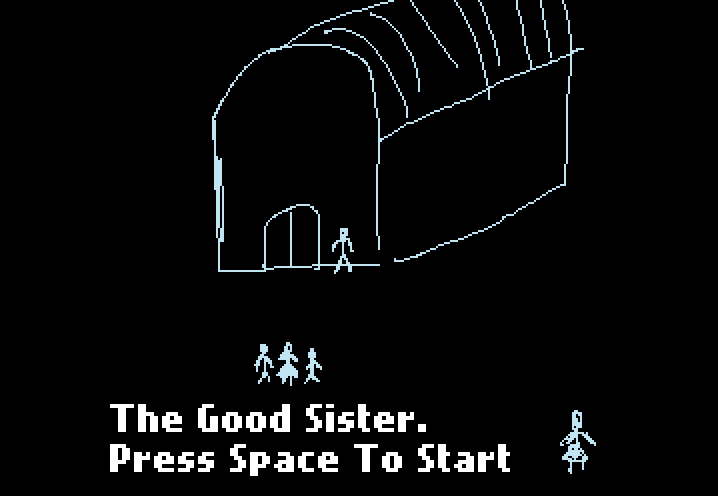
In The Good Sister, you read a tragic tale about a family birthed from abuse.

The player’s role is to provide the Poe-ish incessant tapping which serves as the soundtrack.
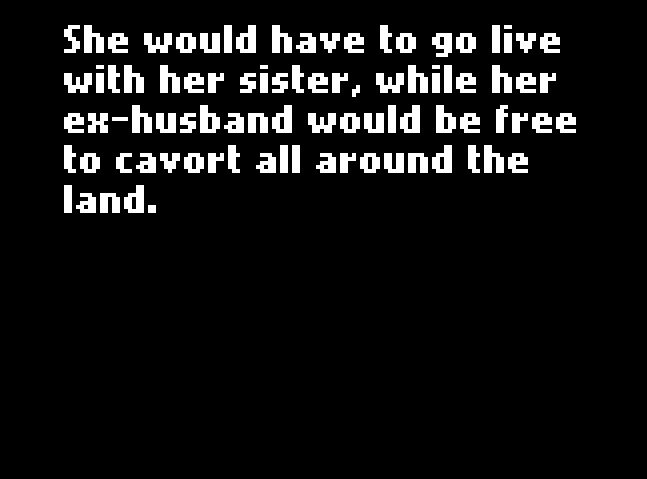
For turning guitar hero’s rhythm timeline into a cringe-making horror, this game is good.
The author of this The Good Sister is Stephen Lavelle and it can be found here.
In The Good Sister, you read a tragic tale about a family birthed from abuse.
The player’s role is to provide the Poe-ish incessant tapping which serves as the soundtrack.
For turning guitar hero’s rhythm timeline into a cringe-making horror, this game is good.
The author of this The Good Sister is Stephen Lavelle and it can be found here.
Subscribe to:
Comments (Atom)
